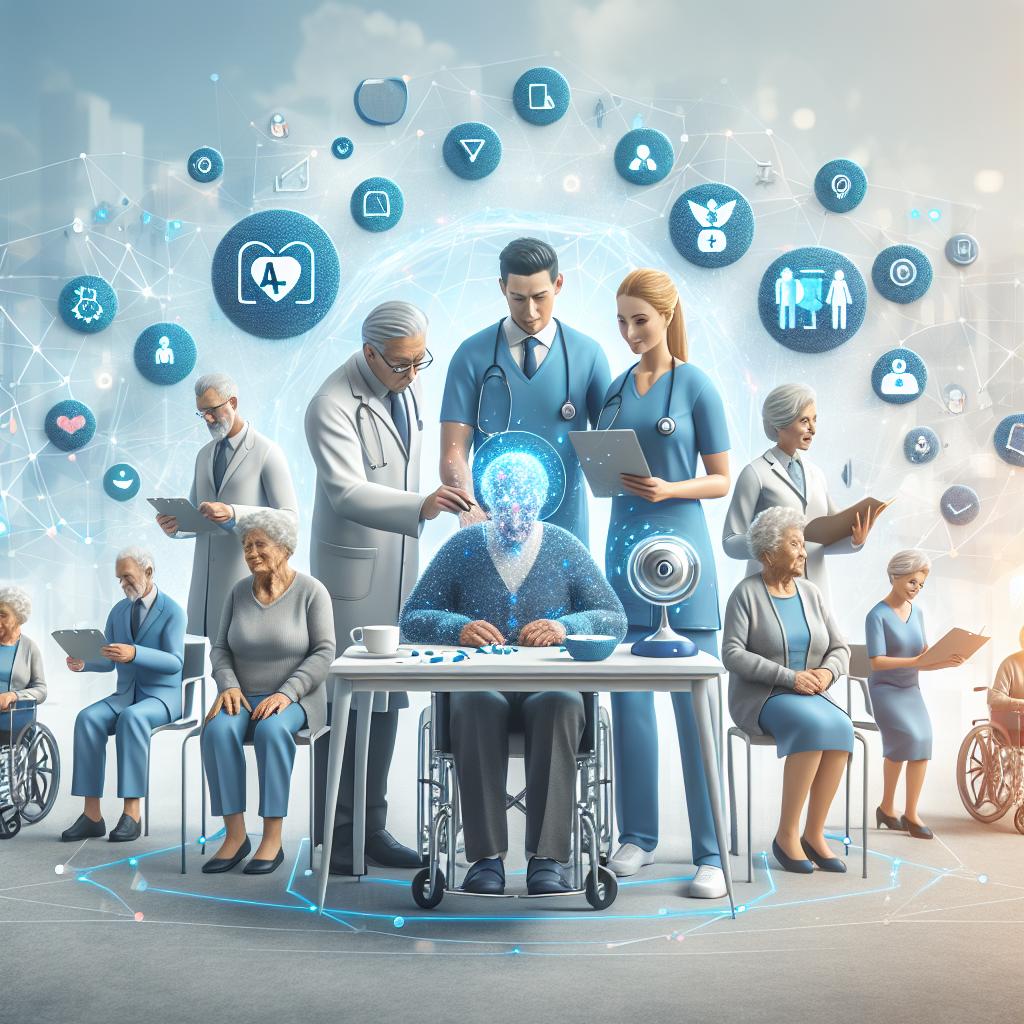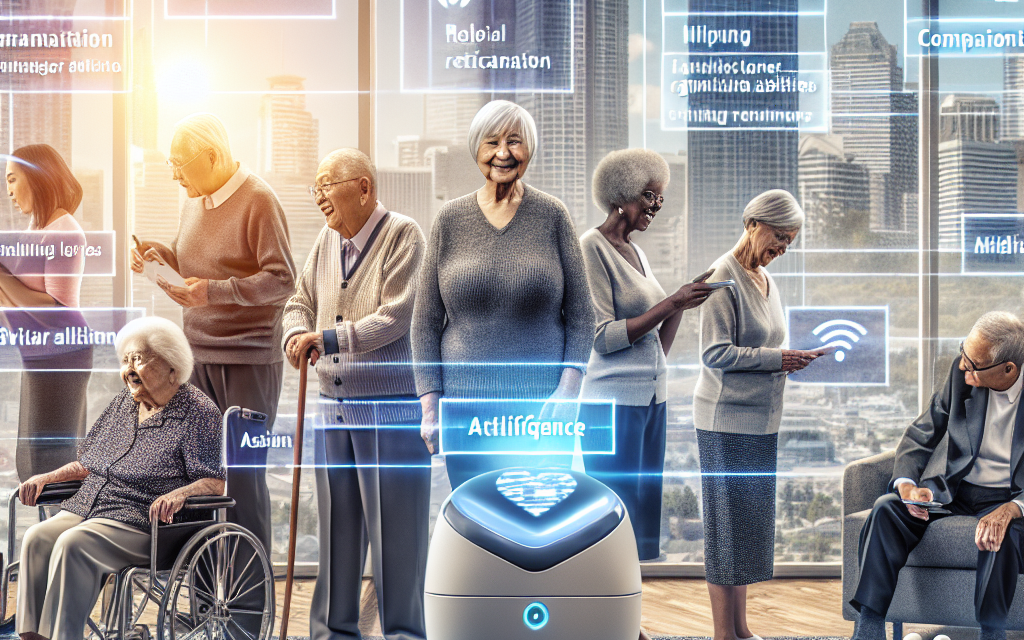Embracing AI: Transforming Senior Care for the Better at LeadingAge24

As the global population ages, the demand for innovative solutions in senior care is more pressing than ever. LeadingAge24, a prominent conference dedicated to advancing senior care, has spotlighted the transformative potential of artificial intelligence (AI) in this sector. This article delves into how AI is revolutionizing senior care, offering insights into its applications, benefits, challenges, and future prospects. By examining real-world examples, case studies, and statistics, we aim to provide a comprehensive understanding of AI’s role in enhancing the quality of life for seniors.
The Role of AI in Enhancing Senior Care
AI is reshaping the landscape of senior care by introducing technologies that improve health outcomes, enhance safety, and promote independence among the elderly. From predictive analytics to robotic assistance, AI is becoming an integral part of senior care facilities and home care services.
Predictive Analytics for Proactive Health Management
Predictive analytics, powered by AI, is revolutionizing how healthcare providers manage the health of seniors. By analyzing vast amounts of data, AI can identify patterns and predict potential health issues before they become critical. This proactive approach allows for timely interventions, reducing hospital admissions and improving overall health outcomes.
For instance, AI algorithms can analyze data from wearable devices to monitor vital signs such as heart rate, blood pressure, and activity levels. By detecting anomalies, healthcare providers can intervene early, preventing complications and ensuring better management of chronic conditions like diabetes and hypertension.
Moreover, predictive analytics can help in medication management. AI systems can analyze prescription data to identify potential drug interactions and ensure adherence to medication schedules, reducing the risk of adverse effects and hospitalizations.
- Early detection of health issues
- Improved chronic disease management
- Enhanced medication adherence
Robotic Assistance for Daily Living
Robotic technology, driven by AI, is playing a crucial role in assisting seniors with daily activities. These robots are designed to support tasks such as mobility, personal care, and companionship, thereby enhancing the quality of life for seniors.
For example, robotic exoskeletons can assist seniors with mobility impairments, enabling them to walk and perform daily activities independently. These devices are equipped with sensors and AI algorithms that adapt to the user’s movements, providing personalized support.
In addition to physical assistance, social robots are being developed to provide companionship and cognitive stimulation. These robots can engage seniors in conversations, play games, and even remind them to take their medications, addressing both physical and emotional needs.
- Mobility support through robotic exoskeletons
- Companionship and cognitive stimulation
- Personalized assistance for daily activities
AI-Driven Safety and Monitoring Systems
Ensuring the safety of seniors is a top priority in senior care. AI-driven safety and monitoring systems are being implemented to provide real-time surveillance and alerts, reducing the risk of accidents and ensuring prompt responses in emergencies.
Smart home technologies, integrated with AI, can monitor the environment for potential hazards such as falls, fires, or gas leaks. These systems can automatically alert caregivers or emergency services, ensuring timely intervention and minimizing harm.
Furthermore, AI-powered cameras and sensors can monitor seniors’ movements and detect unusual patterns, such as prolonged inactivity or wandering, which may indicate health issues or cognitive decline. This continuous monitoring provides peace of mind to both seniors and their families.
- Real-time surveillance and alerts
- Detection of environmental hazards
- Monitoring of movement patterns
Personalized Care Plans through AI
AI is enabling the creation of personalized care plans tailored to the unique needs and preferences of each senior. By analyzing data from various sources, AI can recommend customized interventions and therapies that enhance the effectiveness of care.
For instance, AI can analyze a senior’s medical history, lifestyle, and preferences to develop a comprehensive care plan that includes dietary recommendations, exercise routines, and social activities. This personalized approach ensures that seniors receive care that is aligned with their individual goals and preferences.
Additionally, AI can facilitate communication between healthcare providers, caregivers, and family members, ensuring that everyone involved in the senior’s care is informed and aligned with the care plan.
- Customized interventions and therapies
- Alignment with individual goals and preferences
- Enhanced communication among care teams
AI in Cognitive Health and Dementia Care
Cognitive health is a critical aspect of senior care, particularly for those with dementia or Alzheimer’s disease. AI is being leveraged to develop tools and applications that support cognitive health and improve the quality of life for seniors with cognitive impairments.
AI-powered cognitive training programs are designed to stimulate the brain and improve cognitive functions such as memory, attention, and problem-solving. These programs are personalized to the individual’s cognitive abilities and progress, ensuring effective and engaging interventions.
Moreover, AI is being used to develop virtual reality (VR) experiences that provide cognitive stimulation and emotional engagement. These VR experiences can transport seniors to familiar or new environments, offering a sense of adventure and exploration while supporting cognitive health.
- Cognitive training programs
- Virtual reality experiences for cognitive stimulation
- Support for dementia and Alzheimer’s care
Challenges and Ethical Considerations in AI-Driven Senior Care
While AI offers significant benefits in senior care, it also presents challenges and ethical considerations that must be addressed to ensure its responsible and effective implementation.
Data Privacy and Security Concerns
The use of AI in senior care involves the collection and analysis of sensitive personal data, raising concerns about privacy and security. Ensuring the confidentiality and protection of this data is paramount to maintaining trust and compliance with regulations.
Healthcare providers and technology developers must implement robust data protection measures, including encryption, access controls, and regular security audits, to safeguard seniors’ information from unauthorized access and breaches.
Moreover, transparency in data collection and usage is essential. Seniors and their families should be informed about what data is being collected, how it is used, and who has access to it, empowering them to make informed decisions about their care.
- Robust data protection measures
- Transparency in data collection and usage
- Compliance with privacy regulations
Addressing Bias in AI Algorithms
AI algorithms are only as good as the data they are trained on. If the data is biased or unrepresentative, the algorithms may produce biased outcomes, leading to disparities in care and treatment.
To address this issue, it is crucial to ensure that AI systems are trained on diverse and representative datasets that reflect the varied demographics and health conditions of seniors. Continuous monitoring and evaluation of AI systems are also necessary to identify and mitigate any biases that may arise.
Collaboration between technology developers, healthcare providers, and ethicists can help create guidelines and standards for developing fair and unbiased AI systems in senior care.
- Diverse and representative datasets
- Continuous monitoring and evaluation
- Collaboration for ethical AI development
Ensuring Accessibility and Usability
For AI technologies to be effective in senior care, they must be accessible and user-friendly for both seniors and caregivers. This requires designing interfaces and devices that accommodate the physical and cognitive abilities of seniors.
Developers should prioritize simplicity and ease of use in their designs, incorporating features such as voice commands, large buttons, and intuitive navigation. Providing training and support for seniors and caregivers is also essential to ensure they can effectively use AI technologies.
Additionally, addressing the digital divide by ensuring access to necessary devices and internet connectivity is crucial for the widespread adoption of AI in senior care.
- User-friendly design and interfaces
- Training and support for users
- Addressing the digital divide
Balancing Human Touch with Technology
While AI can enhance senior care, it is essential to balance technological interventions with human touch and empathy. Seniors value personal interactions and relationships, which are critical to their emotional well-being.
AI should be used to complement, not replace, human caregivers. By automating routine tasks and providing data-driven insights, AI can free up caregivers’ time to focus on building meaningful relationships with seniors.
Healthcare providers should emphasize the importance of empathy and compassion in care delivery, ensuring that technology enhances rather than detracts from the human experience.
- Complementing human caregivers
- Emphasizing empathy and compassion
- Enhancing the human experience
Regulatory and Legal Considerations
The integration of AI in senior care is subject to regulatory and legal considerations that must be navigated to ensure compliance and protect the rights of seniors.
Regulatory bodies are developing guidelines and standards for the use of AI in healthcare, focusing on areas such as data privacy, safety, and efficacy. Healthcare providers and technology developers must stay informed about these regulations and ensure their solutions meet the required standards.
Legal considerations also include issues related to liability and accountability. Clear guidelines on responsibility and accountability in the event of errors or malfunctions in AI systems are necessary to protect both seniors and providers.
- Compliance with regulatory standards
- Understanding legal responsibilities
- Protecting seniors’ rights
Case Studies: Successful Implementation of AI in Senior Care
Several organizations have successfully implemented AI technologies in senior care, demonstrating the potential benefits and providing valuable insights for others looking to adopt similar solutions.
Case Study 1: Predictive Analytics in Chronic Disease Management
A leading healthcare provider implemented an AI-driven predictive analytics platform to manage chronic diseases among seniors. By analyzing data from electronic health records, wearable devices, and patient-reported outcomes, the platform identified seniors at risk of complications and recommended personalized interventions.
The results were significant: hospital admissions decreased by 30%, medication adherence improved by 25%, and patient satisfaction scores increased. The success of this initiative highlights the potential of predictive analytics to transform chronic disease management in senior care.
- 30% reduction in hospital admissions
- 25% improvement in medication adherence
- Increased patient satisfaction
Case Study 2: Robotic Assistance in Assisted Living Facilities
An assisted living facility introduced robotic assistants to support seniors with mobility and daily activities. The robots, equipped with AI algorithms, provided personalized assistance based on each resident’s needs and preferences.
Residents reported increased independence and confidence in performing daily tasks, while caregivers noted a reduction in workload and stress. The facility also observed a decrease in fall-related incidents, demonstrating the effectiveness of robotic assistance in enhancing safety and quality of life for seniors.
- Increased independence for residents
- Reduced caregiver workload
- Decrease in fall-related incidents
Case Study 3: AI-Driven Safety and Monitoring in Home Care
A home care agency implemented an AI-driven safety and monitoring system to enhance the safety of seniors living independently. The system included smart sensors and cameras that monitored the home environment and detected potential hazards.
The agency reported a 40% reduction in emergency calls and a 50% decrease in fall-related injuries. Families expressed greater peace of mind knowing their loved ones were being monitored continuously, highlighting the value of AI-driven safety solutions in home care settings.
- 40% reduction in emergency calls
- 50% decrease in fall-related injuries
- Increased peace of mind for families
Case Study 4: Personalized Care Plans in Memory Care Units
A memory care unit utilized AI to develop personalized care plans for residents with dementia. By analyzing data on residents’ cognitive abilities, preferences, and behaviors, the AI system recommended tailored interventions and activities.
The personalized approach led to improved cognitive function, reduced agitation, and enhanced engagement among residents. Caregivers also reported greater satisfaction with their ability to provide individualized care, demonstrating the impact of AI in memory care settings.
- Improved cognitive function
- Reduced agitation among residents
- Enhanced caregiver satisfaction
Case Study 5: Cognitive Health Programs in Senior Centers
A senior center implemented AI-powered cognitive health programs to support seniors’ mental well-being. The programs included personalized cognitive training exercises and virtual reality experiences designed to stimulate the brain and promote social interaction.
Participants reported improved memory and attention, increased social engagement, and a greater sense of well-being. The success of these programs underscores the potential of AI to enhance cognitive health and quality of life for seniors in community settings.
- Improved memory and attention
- Increased social engagement
- Enhanced sense of well-being
The Future of AI in Senior Care: Opportunities and Innovations
The future of AI in senior care holds immense promise, with ongoing innovations and opportunities to further enhance the quality of life for seniors. As technology continues to evolve, new applications and solutions are emerging that have the potential to transform senior care.
Advancements in AI-Powered Wearables
AI-powered wearables are becoming increasingly sophisticated, offering new opportunities for monitoring and managing seniors’ health. These devices can track a wide range of health metrics, from vital signs to sleep patterns, providing valuable insights for personalized care.
Future advancements may include wearables with enhanced capabilities, such as real-time health monitoring, predictive analytics, and integration with other smart home technologies. These innovations have the potential to revolutionize how seniors manage their health and well-being.
- Real-time health monitoring
- Predictive analytics for personalized care
- Integration with smart home technologies
AI-Driven Virtual Companions
Virtual companions powered by AI are emerging as a promising solution for addressing loneliness and social isolation among seniors. These companions can engage seniors in conversations, provide emotional support, and facilitate social interactions.
Future developments may include more advanced virtual companions with natural language processing capabilities, enabling them to understand and respond to seniors’ emotions and needs more effectively. These companions could play a vital role in promoting mental health and well-being among seniors.
- Addressing loneliness and social isolation
- Emotional support and social interaction
- Advanced natural language processing capabilities
Integration of AI with Telehealth Services
The integration of AI with telehealth services is poised to enhance access to healthcare for seniors, particularly those in remote or underserved areas. AI can support telehealth by providing real-time data analysis, remote monitoring, and personalized recommendations.
Future innovations may include AI-driven virtual consultations, where AI systems assist healthcare providers in diagnosing and treating patients remotely. This integration could improve healthcare accessibility and outcomes for seniors, reducing the need for in-person visits.
- Enhanced access to healthcare
- Real-time data analysis and remote monitoring
- AI-driven virtual consultations
AI in Personalized Nutrition and Wellness
AI is being leveraged to develop personalized nutrition and wellness programs for seniors, addressing their unique dietary needs and preferences. By analyzing data on seniors’ health conditions, lifestyle, and preferences, AI can recommend tailored nutrition plans and wellness activities.
Future advancements may include AI-driven meal planning and delivery services, where AI systems create customized meal plans and coordinate delivery based on seniors’ dietary requirements. These innovations have the potential to improve seniors’ nutrition and overall well-being.
- Personalized nutrition plans
- AI-driven meal planning and delivery
- Improved overall well-being
Collaborative AI Systems for Integrated Care
Collaborative AI systems are being developed to facilitate integrated care for seniors, bringing together healthcare providers, caregivers, and family members. These systems enable seamless communication and coordination, ensuring that all stakeholders are aligned in delivering comprehensive care.
Future developments may include AI platforms that integrate data from various sources, providing a holistic view of seniors’ health and well-being. These platforms could support decision-making and care planning, enhancing the effectiveness of integrated care models.
- Seamless communication and coordination
- Holistic view of seniors’ health
- Enhanced decision-making and care planning
Conclusion: Embracing AI for a Better Future in Senior Care
The integration of AI in senior care is transforming the way we approach aging and caregiving. By harnessing the power of AI, we can enhance health outcomes, improve safety, and promote independence among seniors. While challenges and ethical considerations must be addressed, the potential benefits of AI in senior care are undeniable.
As we look to the future, continued innovation and collaboration among technology developers, healthcare providers, and policymakers will be essential to realizing the full potential of AI in senior care. By embracing AI responsibly and ethically, we can create a better future for seniors, ensuring they receive the care and support they deserve.
LeadingAge24 serves as a platform for exploring these opportunities and driving progress in the field of senior care. By sharing knowledge, experiences, and best practices, we can collectively work towards a future where AI enhances the quality of life for seniors worldwide.





